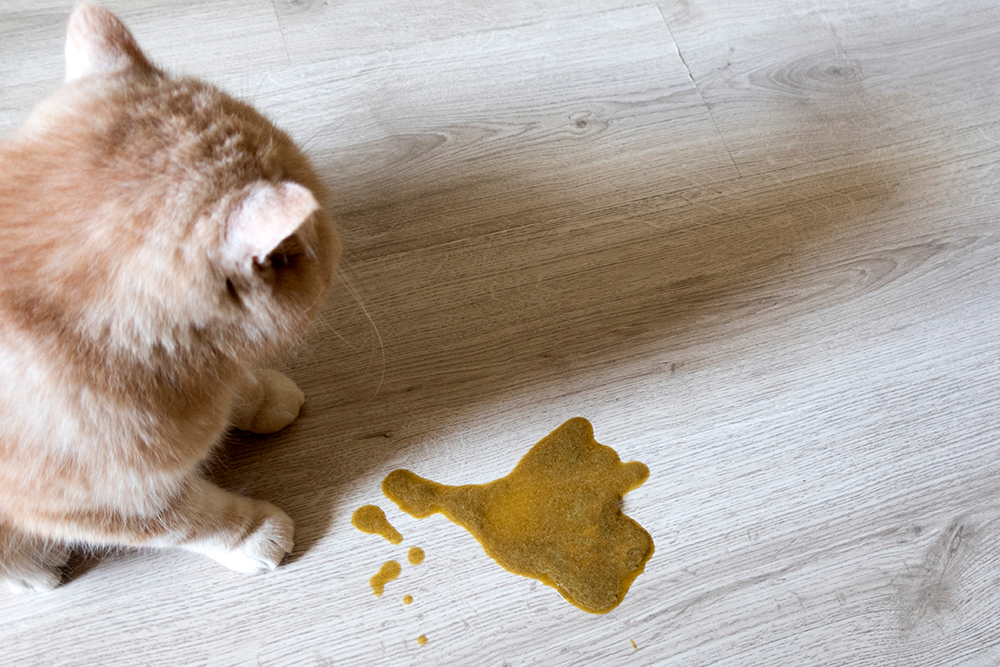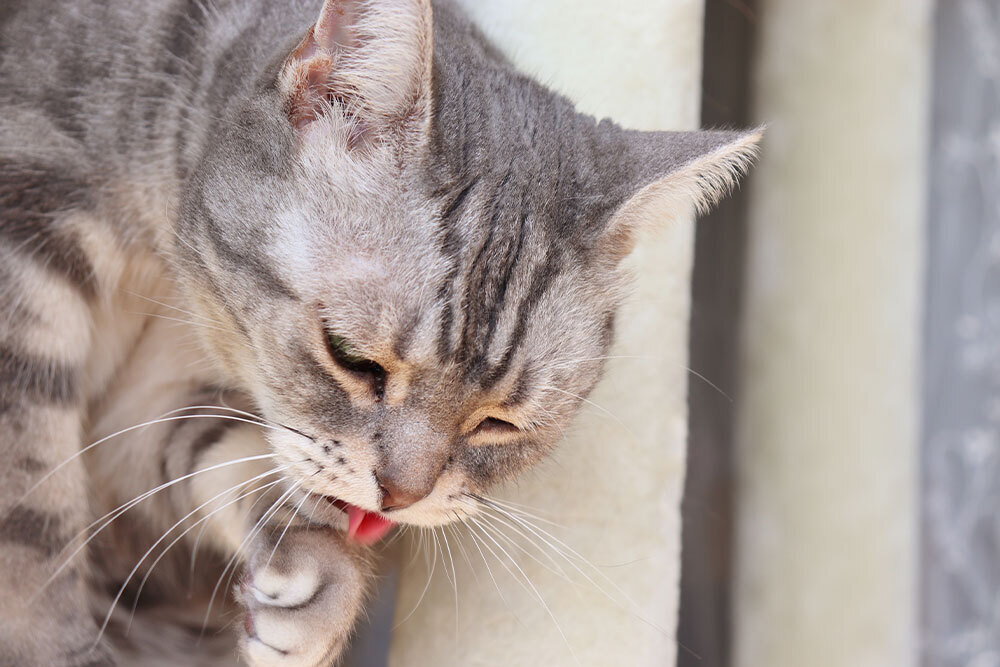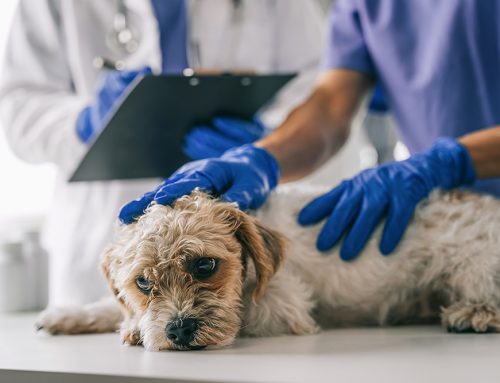Hairballs or Something More? Understanding Cat Vomiting
Cleaning up after a vomiting cat is something most owners face at one point or another. A pile on the rug or a mess on the couch can feel like a frustrating but routine part of sharing life with a cat. But here’s the truth: vomiting is not something to ignore. Whether it happens occasionally or becomes a frequent problem, it is always a signal that something is going on inside your cat’s body. Sometimes it is simple and temporary, like a hairball, but in other cases it can point to more serious health concerns. At Wellness Animal Hospital, the veterinary team helps families sort through the uncertainty so pets can feel better- and owners can feel reassured.
Why Do Cats Vomit?
Vomiting is the body’s way of forcefully emptying the stomach. Unlike regurgitation, which happens passively, vomiting is active and often involves retching or abdominal effort. Cats may vomit for many reasons- dietary changes, infections, chronic illness, stress, or ingesting something they should not. Recognizing the difference between a one-time episode and a recurring problem is key.
Stress deserves special attention. Cats are highly sensitive animals, and changes like moving homes, new pets, or even subtle household disruptions can upset their stomachs. Stress-related vomiting may look like other causes, which is why veterinary guidance is so important.
Common Causes of Vomiting in Cats
Several conditions can lead to vomiting, some minor and some far more serious.
Hairballs
Cats constantly groom themselves, and their rough tongues swallow loose hair. Most of it passes, but sometimes it accumulates into a hairball. These usually appear every few weeks in long-haired cats, but if they occur weekly or more, or your cat struggles to bring them up, it’s time to ask Wellness Animal Hospital for advice. Regular brushing and hydration can help reduce the problem.
Dietary Indiscretion or Food Sensitivity
Sneaking table scraps, chewing plants, or scarfing down food too quickly can all upset a cat’s stomach. Even sudden changes in brand or formula can trigger vomiting. Gradual diet transitions over 7–10 days are best. For safety, review pet food handling guidelines to prevent foodborne illness.
Parasites and Infections
Kittens and outdoor cats are especially vulnerable to intestinal parasites and infections. Regular deworming and routine visits help detect and treat these problems before they cause more serious illness.
Chronic Conditions
Vomiting may also point to long-term health conditions:
- Kidney disease. Declining kidney function in older cats can cause toxin buildup, nausea, and vomiting. Learn more about chronic kidney disease.
- Hyperthyroidism. An overactive thyroid causes rapid metabolism, weight loss, and vomiting. See AAHA’s feline hyperthyroidism guidelines for details.
- Pancreatitis or IBD. Digestive inflammation often leads to repeated vomiting. Understanding pancreatitis can help owners recognize why early care matters.
- Hepatic lipidosis. Also called fatty liver, this life-threatening condition develops when cats stop eating for as little as forty-eight hours. Early feeding support is critical to prevent hepatic lipidosis, especially in overweight cats.
Foreign Bodies and Toxins
Cats are curious by nature, and swallowing items like string, thread, or small toys can quickly turn into an emergency if the object causes a blockage. Even houseplants can be toxic. The ASPCA’s toxic plant list is a good resource for making your home safer.
When to Call the Vet
An occasional hairball or rare episode of vomiting may not require immediate attention. But certain warning signs mean your cat should be seen right away:
- Vomiting that continues longer than 24 hours
- Blood in vomit or material resembling coffee grounds
- A painful, bloated belly
- Weakness, lethargy, or collapse
- Refusal to eat or drink
- Sudden weight loss or signs of dehydration (dry gums, sunken eyes)
If any of these signs are present, call Wellness Animal Hospital for urgent care guidance. Same-day appointments are reserved for pets who need prompt attention.
What to Expect at the Vet
When you bring your cat to Wellness Animal Hospital for vomiting, the first step is a thorough discussion with the veterinary team. They’ll ask when the vomiting began, how often it happens, what the vomit looks like, and whether your cat shows any other changes in appetite, energy, or behavior. Even small details, such as whether your cat has been hiding more, experiencing hairballs more frequently, or recently had a diet change, can make a big difference in narrowing down the cause.
A complete physical exam follows, where the veterinarian checks hydration status, feels for abdominal pain or masses, and listens for abnormalities in the heart and lungs. From there, diagnostics are often recommended. Common options include:
- Bloodwork and urinalysis, which help assess organ function and identify issues like kidney disease, diabetes, or infection.
- X-rays, which can reveal blockages, foreign objects, or changes in organ size.Ultrasound, a non-invasive tool that provides a detailed look at the stomach, intestines, liver, pancreas, and other abdominal organs.
- Fecal testing, which detects intestinal parasites that may otherwise go unnoticed.
In more complex cases, advanced diagnostics may be necessary. Endoscopy allows the veterinarian to look directly into the stomach and intestines, collect biopsies, or remove swallowed items without surgery. If a severe blockage, mass, or other urgent problem is found, surgery may be the best way to treat the issue and give your cat relief.
Treatment and Care
Once the cause of vomiting is identified, your veterinarian will create a treatment plan tailored to your cat. That plan may include:
- Fluids given under the skin or intravenously to rehydrate and restore electrolyte balance.
- Medications to ease nausea, reduce stomach acid, control inflammation, or clear infections.
- Parasite control for cats with worms or other intestinal invaders.
- Specialized diets, such as easily digestible food for sensitive stomachs or prescription diets for kidney or liver disease.
- Surgical intervention in cases where foreign bodies or masses need to be removed.
The veterinary team explains each step so owners understand the “why” behind every recommendation. During an exam, the veterinary team gathers a thorough history: when vomiting started, what it looks like, and whether there have been any recent diet or lifestyle changes. Cats are often nervous at the vet, so the staff takes the time to make each visit as calm and gentle as possible.
Helping Your Cat at Home
While not every case of vomiting can be prevented, cat owners play an important role in keeping their pets comfortable. Regular brushing, especially for long-haired cats, helps reduce hairball formation. Feeding smaller, more frequent meals instead of one large meal often prevents stomach upset and helps cats that tend to gulp food. Puzzle feeders are also a great way to slow down fast eaters while providing enrichment.
Creating a safe environment- keeping harmful plants, string, and small objects out of reach- protects curious cats from ingesting dangerous items. For some cats, reducing stress makes a big difference. Providing quiet hiding spots, using calming pheromone diffusers, and maintaining consistent routines can help prevent stress-related vomiting.
Regular wellness visits are another cornerstone of prevention. Cats are skilled at hiding illness, and subtle changes often go unnoticed at home. Routine exams at Wellness Animal Hospital give the team the chance to detect problems early, before they progress into more serious conditions.
Moving Forward: The Care Your Cat Deserves
Frequent vomiting is never normal, and it always deserves attention. At Wellness Animal Hospital, families find more than just veterinary expertise- they find a team that cares deeply about both pets and the people who love them. With four convenient locations across Lakewood Ranch, Bradenton, Sarasota, and Parrish, and a commitment to same-day urgent care when pets need it most, support is always within reach.
If your cat’s vomiting has become a pattern, or if you’re unsure whether it’s cause for concern, don’t wait. Call (941) 499-7171, email info@wellnessah.com, or schedule an appointment. At Wellness Animal Hospital, veterinary medicine is more than a service. It’s a passion, a promise to care for pets and people like family, and a belief in what love deserves.








Leave A Comment